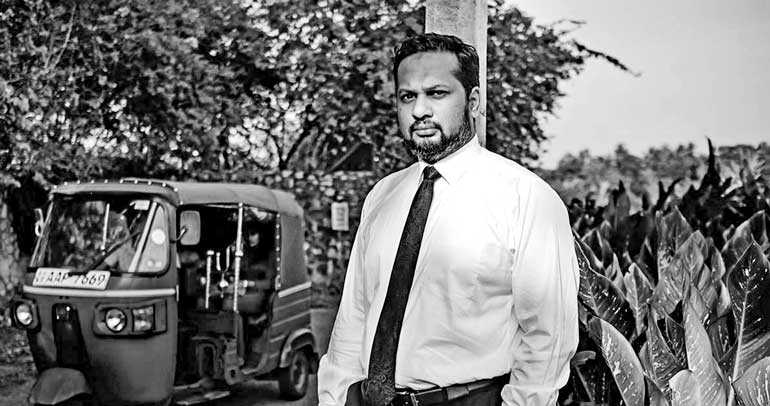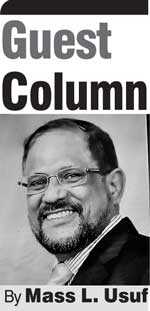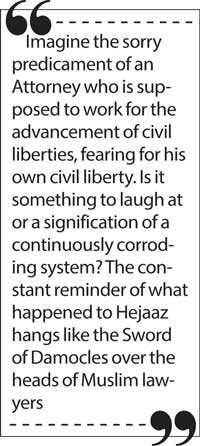Tuesday Feb 17, 2026
Tuesday Feb 17, 2026
Tuesday, 15 December 2020 00:00 - - {{hitsCtrl.values.hits}}

Hejaaz Hizbullah is not alone. Like him there are so many others under detention orders unable to make sense of what is in store for them. Neither charged nor released, they are in a continuous state of suspense. Just like a live bird in a skewer over fire. It does not want to die burning but, yet, it does not have the freedom to fly away
On 9 December, at the Committee Stage Debate in the Parliament on the Appropriation (2021) Bill, Member of Parliament M.A. Sumanthiran made some terse remarks given the limited time allotted to him.
He justified the need for an international inquiry and international judicial process to look into serious crimes committed in this country which has an impact on international law. In order to drive home his point, he alluded to several instances and, euphemistically made reference to the “depths to which your judicial system has sunk”.
As a recent example he cited Hejaaz Hizbullah, an Attorney-at-Law who is currently in detention. Sumanthiran said: “A brilliant young lawyer denied justice for eight months. All kinds of false allegations were made against him.”
Further, he drew attention to the fact that if there were any grounds for prosecution, they should have filed charges against him. The Opposition Member of Parliament questioned the Minister of Justice Ali Sabry: “What were you doing for eight months?”
Voicing concern over the sacrosanct attorney/client communication, he pointed out that two of the client briefs of Attorney Hejaaz Hizbullah were taken away. He also deplored the fact that Hejaaz had not been given proper access to his lawyer. Sumanthiran then emphatically asked the million dollar question: “If you treat a lawyer like that, how do we expect you to treat anybody else?”
Muzzling Muslim politicians
Unlike Sumanthiran, not many Muslim politicians dare to express themselves in Parliament. One may question, why not? The answer is in the lack of cohesiveness between the Muslim politicians, at least on matters of common interest. It is very rare. Some are gagged by the influence of external factors, political slavery. Ironically, among them are also those probably not really aware why the hell they are sitting in Parliament – daydreaming!
As for the handful of the handful who wish to speak, the moment they do say something relating to the detention of Hejaaz and the many others or on any matter relating to the Easter Sunday attack, they would be accused of aiding and abetting extremism. Many Government members in Parliament deliberately do not allow the person to speak by drowning his voice with louder noise of interruptions and unruly behaviour.
Hot on the heels of such accusations are the notorious spin doctors, the media. They would build up a misleading or deceptive story incriminating the politician to create a negative impact of that person. Other vested interests, in this grand agenda, would pick it up from there and give their own interpretation, modify and reframe the allegations exacerbating the negative public opinion created.
By this method the voice of the few who have the nerve to speak are often silenced or overwhelmed by disturbance. Freedom of expression, leave alone outside the Parliament, even under the Parliamentary Privileges has been stultified in our august assembly by vested interests.
Psychological torture
Hejaaz Hizbullah is not alone. Like him there are so many others under detention orders unable to make sense of what is in store for them. Neither charged nor released, they are in a continuous state of suspense. Just like a live bird in a skewer over fire. It does not want to die burning but, yet, it does not have the freedom to fly away.
This state of affairs naturally causes much anxiety and depression not only to those who are detained in this manner but also to the near and dear ones. This is plain and simple mental torture violating the fundamental right against torture enshrined in the constitution besides the international ratifications.
(1) The Charter of the United Nations in relation to obligation of States under the Charter states in Article 55 (c):
“universal respect for, and observance of, human rights and fundamental freedoms for all without distinction as to race, sex, language, or religion.”
(2) The United Nations Universal Declaration of Human Rights 1948 banning torture mentions in Article 5:
“No one shall be subjected to torture or to cruel, inhuman or degrading treatment or punishment.”
(3) The ban is further enshrined in Article 7 of the International Covenant on Civil and Political Rights:
“No one shall be subjected to torture or to cruel, inhuman or degrading treatment or punishment.”
(4) The Convention against Torture and Other Cruel, Inhuman or Degrading Treatment or Punishment adopted in 1984 defines torture, in Article 1.1:
“For the purposes of this Convention, the term “torture” means any act by which severe pain or suffering, whether physical or mental, is intentionally inflicted on a person …”
Article 2.2
“No exceptional circumstances whatsoever, whether a state of war or a threat of war, internal political instability or any other public emergency, may be invoked as a justification of torture.”
The draconian PTA
The infamous and dreaded Prevention of Terrorism (Temporary Provisions) Act, No. 48 of 1979 as amended provides the legality for such incarceration. The PTA was a law enacted to prevent terrorism but it is alleged that many people with no connection to terrorism have been arrested and detained under its provisions.
Imagine the sorry predicament of an Attorney who is supposed to work for the advancement of civil liberties, fearing for his own civil liberty. Is it something to laugh at or a signification of a continuously corroding system? The constant reminder of what happened to Hejaaz hangs like the Sword of Damocles over the heads of Muslim lawyers. They were in other words indirectly pressurised into silence except for some selected Attorneys. Who would want to face the situation that Hejaaz Hisbullah is in? This form of pressure is not sustainable because with the passage of time, people do bounce back when the level of tolerance is exceeded.
Lawyers on tenterhooks
With the arrest of Hejaaz, the Muslims lawyers felt an unprecedented sense of insecurity in their professional and personal life. Such was the threat of the PTA and its tool of unpredictable detention. Members of the legal profession are supposed to be in a privileged status because they are part of ‘the administration of justice and essential for the maintenance of law and order and the preservation and advancement of civil liberties and the maintenance in general of the rule of law’. (Professional Ethics, A.R.B. Amerasinghe, Page 43)
We also witnessed the most unfortunate split among lawyers on the matter of Hejaaz. Can it be considered fair if the public questions the depth to which the legal profession has sunk?
Such unprofessionalism was openly noticed among some of the doctors too, who failed to speak out on Dr. Shafi’s issue, the so called ‘wanda pethi’ and so many other stupidest allegations made.
It is a dishonour to see professionalism being a pawn to racism and racist agendas. Professional ethics and conduct demand a level higher than the conduct of an average person. “The legal profession has a responsibility to ensure that its guiding principles are conceived in the public interest and not in furtherance of parochial or self-interest concerns of the Bar and its members.” (ibid, Page 43).
Unaware of the pressure, limitations and fear that had mentally terrorised most of the Muslim lawyers, the Muslim community was often accusing the Muslims lawyers for maintaining silence at times they were supposed to speak out.
In the words of Crampton J. in Rex v. O’Connell: “This court in which we sit is a temple of justice; and the advocate at the bar, as well as the judges upon the benches, are equally ministers in that temple. The object of all equally should be the attainment of justice; now justice is to be reached through the ascertainment of the truth…”
It is time that the legal fraternity get their act together and function in furtherance of justice, equity and fairness. Let the lawyers stand up as true and good ministers of the temple of justice and, be an example to other professions as well.
(The writer is an Attorney-at-Law and former Corporate and Legal Advisor.)